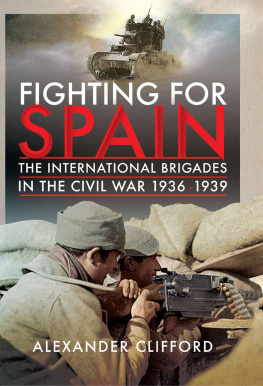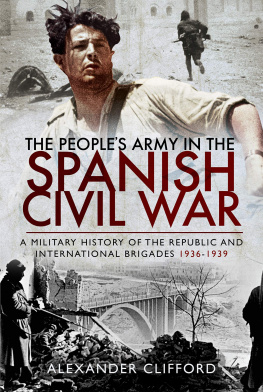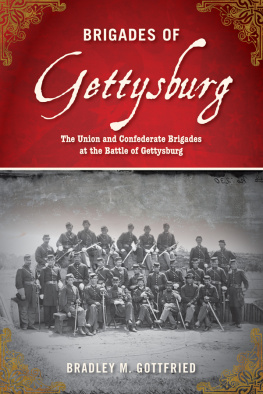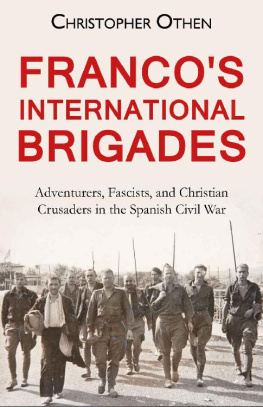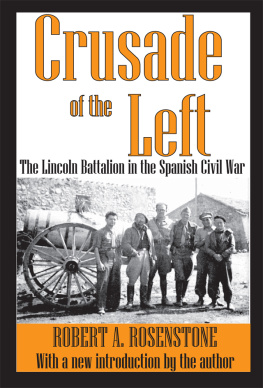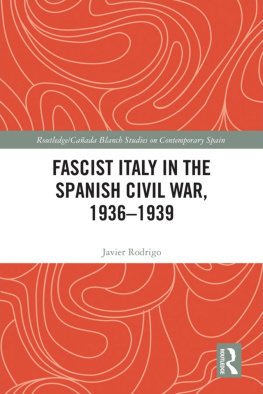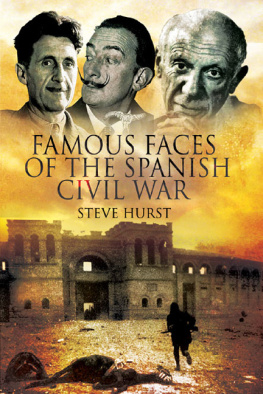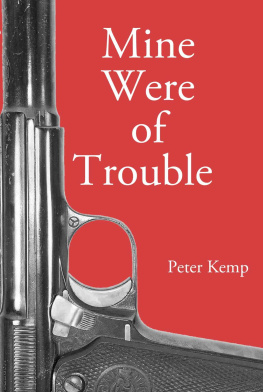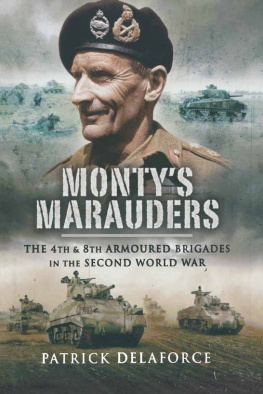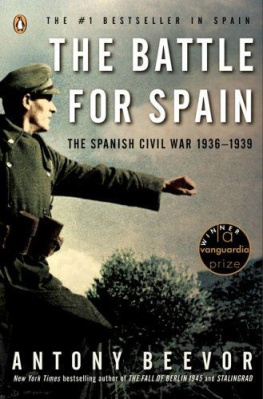Pagebreaks of the print version

Fighting for Spain
Fighting for Spain
The International Brigades in the Civil War, 19361939
Alexander Clifford
First published in Great Britain in 2020 by
PEN & SWORD MILITARY
An imprint of Pen & Sword Books Ltd
Yorkshire Philadelphia
Copyright Alexander Clifford, 2020
ISBN 978-1-52677-438-5
eISBN 978-1-52677-439-2
Mobi ISBN 978-1-52677-440-8
The right of Alexander Clifford to be identified as the author of this work has been asserted by him in accordance with the Copyright, Designs and Patents Act 1988.
A CIP catalogue record for this book is available from the British Library.
All rights reserved. No part of this book may be reproduced or transmitted in any form or by any means, electronic or mechanical including photocopying, recording or by any information storage and retrieval system, without permission from the Publisher in writing.
Pen & Sword Books Ltd incorporates the Imprints of Aviation, Atlas, Family History, Fiction, Maritime, Military, Discovery, Politics, History, Archaeology, Select, Wharncliffe Local History, Wharncliffe True Crime, Military Classics, Wharncliffe Transport, Leo Cooper, The Praetorian Press, Remember When, White Owl, Seaforth Publishing and Frontline Publishing.
For a complete list of Pen & Sword titles please contact
PEN & SWORD BOOKS LTD
47 Church Street, Barnsley, South Yorkshire, S70 2AS, England
E-mail:
Website: www.pen-and-sword.co.uk
or
PEN & SWORD BOOKS
1950 Lawrence Rd, Havertown, PA 19083, USA
E-mail:
Website: www.penandswordbooks.com
Dedication
For Peter Anderson, to whom I owe the enormous debt of igniting a livelong passion.
Acknowledgements
I wish to thank my friends and family, most of all my partner Risn, my brother Freddy (who has written the profiles on weapons included in this volume) and my parents, for all the help and support they have given me over the last couple of years in researching and writing this book. My research into the civil war would have been impossible without my friend Jose Del Pino, whose translation skills have made up for my own linguistical deficiencies. Finally, I must pay tribute to Pen & Sword and especially to Rupert Harding for doing so much to shape this project, Dom West for drawing the fantastic military maps commissioned for the book and Sarah Cook, my editor, who has quite simply worked wonders!
All images used in this book are public domain images sourced from Wikimedia Commons, unless otherwise stated in the caption. The author would like to thank the Imperial War Museum, German Bundesarchiv and Magnum Photos for use of their collections. For those images which are reproduced under Creative Commons Share Alike licences, the full licence can be found at the web addresses below.
Disclaimer : While every effort has been made to trace copyright holders, if any have inadvertently been overlooked, please contact the publishers, who will be pleased to acknowledge them in future editions of the work.
Creative Commons licences can be viewed in full at:
CC BY-SA 4.0:
https://creativecommons.org/licenses/by-sa/4.0/legalcode
CC BY-SA 3.0 DE:
https://creativecommons.org/licenses/by-sa/3.0/de/legalcode
CC BY-SA 3.0:
https://creativecommons.org/licenses/by-sa/3.0/legalcode
CC BY 2.5:
https://creativecommons.org/licenses/by/2.5/legalcode
CC BY 2.0:
https://creativecommons.org/licenses/by/2.0/legalcode
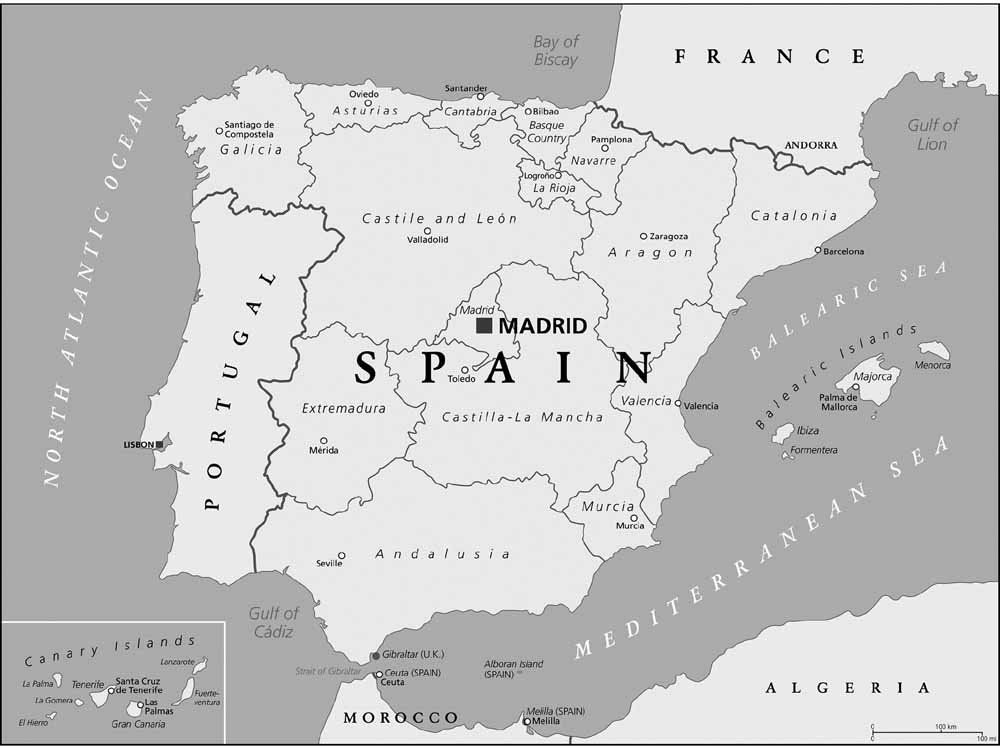
Spains regions and regional capitals. ( Shutterstock.com/Peter Hermes Furian 720418006 )
Introduction
Spains Civil War
In July 1936 Rebel generals launched a coup against the left-wing elected government of the Spanish Republic. Eventually coming to be led by General Francisco Franco, the Rebels, who labelled themselves Nationalists, but were widely referred to as Fascists, soon found that their coup had failed, serving only to split the nation into two rival zones, one insurgent, the other Loyalist. Over the next three years the two factions, driven by ideological idealism and hatred, fought one of Europes bloodiest civil wars. Foreign intervention was to prove crucial in the outcome of the struggle, with Franco gaining support from Hitler and Mussolini less than a fortnight into the conflict and Soviet aid to the Republicans arriving some months later.
In the English-speaking world, the Spanish Civil War is perhaps best remembered through the exploits of thousands of foreign volunteers from across the globe who joined the International Brigades a Comintern-organised force of Communists, Socialists and others who took their opposition to fascism to extraordinary lengths. Their passionate political commitment to Spains cause and their determination in battle led to them becoming the crack troops of the Republics newly built Peoples Army, time and again at the tip of the spear, fighting in the toughest spots. Although never totalling many more than 15,000 men in an army that eventually exceeded 800,000, a confidential Soviet report on the state of the Brigades at one of their lowest ebbs in terms of numbers and morale described them as representing a quarter of the Republics shock troops troops the Republic simply could not do without. The reason for this was that a high proportion of the men in the ranks of the International Brigades were commissar material, ideologically devoted to the cause, unlike many of the Peoples Armys reluctant conscripts and unreliable militiamen. However, the story of the Brigades is one of idealism and incompetence in equal measure; the leadership, tactics and firepower of the Internationalists were often found wanting and their fighting spirit was worn away by frequent military disasters. Reportedly a staggering 93 per cent of the Brigaders would become casualties if minor injuries are counted alongside killed, wounded, missing and captured virtually every volunteer who survived the war had suffered at least a minor wound in the countless bloody combats the Internationals fought.

Francisco Franco, Europes youngest general, hero of the Rif War, Nationalist Generalissimo, Caudillo (leader) of Spain for life after his victory in the civil war.

Territorial division of Spain at the outbreak of civil war in July 1936. Republican-held territory is dark, Nationalist light. ( Wikimedia User Nordnordwest, CC BY-SA 3.0 )
The Spanish Civil War is a complex conflict that can be best understood in the wider European context of the rise of fascism in an age of ideological extremes. Spain was a backwards nation by Western standards, with high levels of illiteracy and relatively little industry and infrastructure. Poverty, especially in the rural south, was extreme and the social divisions between landowners and peasants, employers and unions, Catholics and anti-clericals were almost impossible to bridge. Additionally, Spain had entirely lost the world empire which once marked it out as a great power, save a small protectorate in northern Morocco, just across the Straits of Gibraltar. A long and bitter colonial war fought in the Moroccan Rif from 1909 to 1926 only served to highlight Spanish weakness, with victory not coming until French intervention in the conflict. Amidst a wave of optimism, a new political system emerged from a bloodless revolution in the spring of 1931 with the foundation of the Spanish Second Republic Spains first true democracy, at least in the modern sense of the term. A coalition of Republicans (liberal, middle-class parties) and the Socialist labour movement drafted a new constitution which promised democratic rights and greater economic equality. However, it was immediately seen as a partisan document by much of the political right, while many of the left felt the pace of change was too slow. The new government clearly made mistakes in directly challenging the power and position of the Catholic Church and army, serving only to stoke passions and unite the opposition. Tensions rose further as rebellions by right-wingers in the army and far-left Anarchists were defeated and Catalonia was granted autonomy, anathema to Spanish Nationalists. Eventually, the coalition of Socialists and Republicans who had created the new system fell apart over the frustrations of office, with many on the left losing faith in the democratic project, given the intractable opposition of landowners and bosses to reforms such as land redistribution. As a result, Rightists took control of parliament in the elections of 1933 and began to turn back the Republican tide, undoing the previous governments work.

